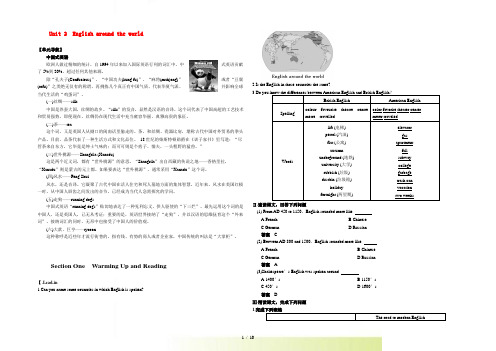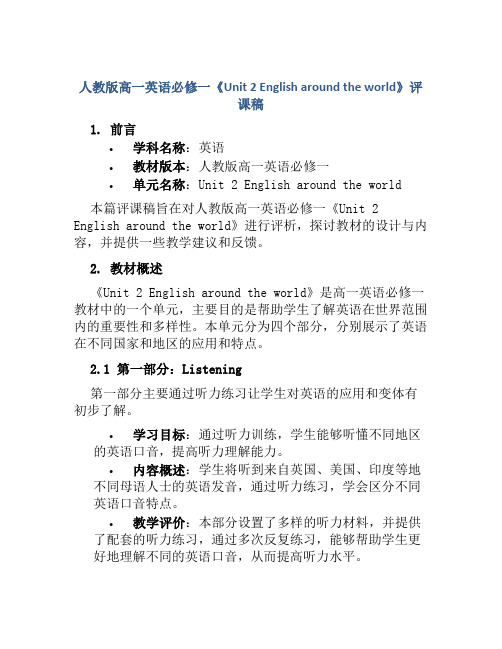人教版高一unit2 English around the world-Using Language
(完整word版)人教版英语必修一第二单元-unit2教学设计

Unit2 English around the worldReading The road to modern English教学设计高一英语李海娟一、教材分析1.本单元的中心话题是“世界英语”, 介绍了英语在世界上的重要性。
warming-up 简要介绍了英语语言在不同国家的差异, 是学生对英国英语和美国有了粗浅的了解。
Pre-reading的问题是针对阅读课文的赌钱思考, 激活学生已获背景知识, 激发学生阅读的兴趣。
Reading “A road to modern English”简要说明了英语语言的起源、发展变化、形成原因及发展趋势。
本课的语言知识主要围绕世界英语这一中心话题进行设计。
本课时主要分为三部分:2.pre- reading (读前准备) 此部分为热身活动3.reading (阅读)4.post-reading (读后)1.二、教学目标:2.学生通过阅读文章能够从篇章结构的角度出发描述英语语言发展的历史过程3.学生能够在阅读过程中对主要的阅读信息进行记录。
三、学生能够了解英语在世界上的发展情况, 意识到学习英语的重要性的同时, 也要热爱自己的祖国, 热爱自己的母语。
四、教学步骤Step 1 leading-in (individual work)2. 1.D.yo.lik.learnin.English.An.why?3.Can you name some countries in which English is spoken?.Engl nguage.The.as.on.o.tw.student.t.mar.thes.countrie.o.th.map.(通过层层设置问题, 引入本课话题, 引导学生思考, 使学生自然而然进入教学中, 激发学生学习英语的欲望。
)Step2 fast-reading (pair work)T.well.a.w.know.ther.i.mor.tha.on.kin.o.Englis.i.th.world.The.ar.differen.fro.on.an othe.i.som.ways.Wh.ha.Englis.change.ove.time.Wha.wil.worl.Englis.b.i.th.future.D.yChec.th.answers.As.som.student.t.tel.thei.answers.afte.givin.th.answers.the.shoul .als.tel.ho.the.fin.th.answers.(快速阅读后要求学生了解文章大意, 并能对全文的结构有一个认识。
高中英语 Unit2 English around the world 教材导学 新人教版必修1

Unit 2 English around the world【单元导航】中国式英语欧洲人做过精细的统计,自1994年以来加入国际英语行列的词汇中,中式英语贡献了5%到20%,超过任何其他来源。
除“孔夫子(Confucious)”、“中国功夫(kung fu)”、“麻将(mahjong)”或者“豆腐(tofu)”之类绝无仅有的称谓,再挑拣几个真正有中国气质、代表华夏气派、并影响全球当代生活的“鸡蛋词”。
(一)丝绸——silk中国是养蚕大国,丝绸的故乡。
“silk”的发音,显然是汉语的音译,这个词代表了中国高超的工艺技术和贸易强势。
即便现在,丝绸仍在现代生活中充当雍容华丽、典雅高贵的象征。
(二)茶——tea这个词,又是英国人从拗口的闽南话里偷走的。
茶,和丝绸、瓷器比肩,堪称古代中国对外贸易的拳头产品。
目前,品茶代表了一种生活方式和文化品位。
18世纪的柴斯特顿勋爵在《训子家书》里写道:“尽管茶来自东方,它毕竟是绅士气味的;而可可则是个痞子、懦夫,一头粗野的猛兽。
”(三)世外桃源——Shangrila (Xanadu)这是两个近义词,都有“世外桃源”的意思。
“Shangrila”出自西藏的传说之地——香格里拉,“Xanadu”则是蒙古的元上都。
如果要表达“世外桃源”,通常采用“Xanadu”这个词。
(四)风水——Feng Shui风水,还是音译。
它凝聚了古代中国在活人住宅和死人墓地方面的集体智慧。
近年来,风水在美国红极一时,从中国人唇齿之间发出的音节,已经成为当代人急需探究的学问。
(五)走狗——running dogs中国式英语“running dogs”贴切地表达了一种见利忘义、供人驱使的“下三烂”。
最先运用这个词的是中国人,还是英国人,已无从考证;重要的是,英语世界接纳了“走狗”,并以汉语的思维抚育这个“外来词”。
接纳词汇的同时,无形中也接受了中国人的价值观。
(六)大款、巨亨——tycoon这种称呼是近些年才流行街巷的,指有钱、有势的商人或者企业家,中国传统的叫法是“大掌柜”。
人教版高中英语必修一 Unit2English around the world

人教版高中英语必修一Unit2English around theworld人教版高中英语必修一Unit2English around the world 的单词和词组练习一、基本词汇:n. :1) elevator 电梯2) gas气体;汽油;煤气;毒气3) apartment(美)公寓4) spelling拼写;拼法5) Singapore新加坡6) lorry(英)卡车7) lightning闪电8) cab出租车9) petrol(英)汽油10)voyage航行;航海11)vocabulary词汇;词汇量;词汇表12)identity本身;本体;身份13)Malaysia马来西亚;马来群岛14)accent口音;腔调;重音15)block街区;块;木块;石块adj. :1) latter较后的;后半的;(两者中)后者的2) African非洲的;非洲人的;非洲语言的3) southeastern东南方的4) Midwestern中西部;有中西部特征的5) eastern东部的;东方的6) northwestern西北方的n./v. :1)base以……为基础;基部;基地;基础2)mand命令;指令;掌握;命令;指挥;支配3)request请求;要求n./adj.:1)native本地人;本国人;本国的;本地的2)Danish丹麦语;丹麦的;丹麦人的;丹麦语的3)Spanish西班牙人;西班牙语;西班牙的;西班牙人的;西班牙语的adj/adv.1) straight直接;挺直;直的;笔直的;正直的二、重点词汇:1) use n&v. 用处;使用 usage n.用法;词语惯用法2) express v.表达 expression n.词语;表达;表情3) recognize v. 辨认出;承认 recognition n.认出;识别;承认4) actually adv. 实际上 actual adj.实际上的5) graadually adv. 逐渐地;逐步地 gradual adj.逐渐的;逐步的6) fulently adv. 流利地 fluency n.流利;流畅 fulent adj.流利的7) frequently adv. 常常;频繁地 frequent adj.频繁的;常见的8) office n. 办公室 official adj.官方的三、重点短语:1) because of… 由于;因为because of和 because的区别:beccause of(后接词组或单词)because (作连词,后跟句子)eg:He was late not only because of his illness but also because he missed the train.不仅因为他的病痛而且因为他误了火车他才迟到的。
人教高中英语 必修一 Unit-2-English-around-the-world(共51张PPT)

The seeds come up in spring. 长出来 A few new questions came up at the meeting. 被提出
come up with 意为“提出,
想出”。如:
He came up with a new suggestion.
come across v. 偶遇;无意中发现 come back v.回来;记起;恢复 原状,重新流行
用base的适当形式填空。
1. This book ________ is based on a true story.
2. Mary always ______ bases her ideas on
scientific experiments.
2) present
adj.
当前的, 现在的 (作前置定语)
vt. 赠与, 赠给予, 给, 提出
present sb. with sth.或 present sth. to sb.
把……交给, 颁发, 授予
e.g. Mother presented a gift to me just now.
On his birthday, his friends presented him
with a series of readers /presented a series
of readers to him. (送给他一套读本)
5. Then gradually between about AD 800 and 1150, English became less like German because those who ruled England spoke first Danish and later French. 【翻译】 然后,渐渐地,大约在公元 800年到1150年期间,英语不那么像德 语了,因为那时英国的统治者起初讲丹 麦语后来讲法语。
人教版高中英语 必修一 Unit2 《English around the world---Reading》 课件 (共27张ppt).ppt

Conclusion
Language can change with time.
Language can change
time
when cultures
communicate with
each other.
place
Some people say that Chinese is a much more elegant language, so it is more important for us to master it and it is not so necessary to master foreign language. Do you agree with this opinion and why?
Noah Webster Born: October 16, 1758 Died: May 28, 1843 When Noah was 43, he started writing the first American dictionary. He did this because Americans in different parts of the country spelled, pronounced and used words differently.
3 ____ will tell if Chinese English develop its own identity. A time B people
Thinking
Will Chinese English become one of the world Englishes?
“Only time will tell”.
Choose the main idea of the text.
人教版高一英语必修一Unit2全

【答案】 A
5.make use of 利用 【用法】use前可用good,full,poor, little等词修饰。如: As a student, you must make full use of your spare time. 作为学生,你必须充分利用课余时间。 Make good use of every chance to practise speaking English and your spoken English will be better soon. 充分利用每一次练习说英语的机会,那 么,你的英语口语很快就会变好。
I'll tell you later. 我以后再告诉你。 3)latter最常用的含义是“两者中的(后者)”, 常与the连用,固定搭配“the former…, the latter…”。如: Here are Tom and David; the latter is my brother. 这是汤姆和戴维;后者是我的兄弟。 4)lately是副词,意为“近来,最近 recently”。如: Have you been to Beijing lately? 你最近去过北京吗?
3.base 基础;基地;根基 (1) n.___________________ Eg: Our company’s base is in beijing. 建于…之上;以…为基础 (2) vt. ____________________ 用法:base A on B A以B为基础 被动 A be based on B A建于B基础之上 Eg: (1)One should always base his opinion on facts. 被动 One’s opinion should always be based on facts.
人教版高一英语必修一《Unit 2 English around the world》评课稿

人教版高一英语必修一《Unit 2 English around the world》评课稿1. 前言•学科名称:英语•教材版本:人教版高一英语必修一•单元名称:Unit 2 English around the world 本篇评课稿旨在对人教版高一英语必修一《Unit 2 English around the world》进行评析,探讨教材的设计与内容,并提供一些教学建议和反馈。
2. 教材概述《Unit 2 English around the world》是高一英语必修一教材中的一个单元,主要目的是帮助学生了解英语在世界范围内的重要性和多样性。
本单元分为四个部分,分别展示了英语在不同国家和地区的应用和特点。
2.1 第一部分:Listening第一部分主要通过听力练习让学生对英语的应用和变体有初步了解。
•学习目标:通过听力训练,学生能够听懂不同地区的英语口音,提高听力理解能力。
•内容概述:学生将听到来自英国、美国、印度等地不同母语人士的英语发音,通过听力练习,学会区分不同英语口音特点。
•教学评价:本部分设置了多样的听力材料,并提供了配套的听力练习,通过多次反复练习,能够帮助学生更好地理解不同的英语口音,从而提高听力水平。
•建议与反馈:为了进一步提高学生的听力理解能力,可以增加一些真实英语对话的听力材料,并提供更多的听力练习题,引导学生进行听力训练。
2.2 第二部分:Speaking第二部分通过讲话和对话的练习,提高学生的口语表达能力以及交际能力。
•学习目标:通过课堂练习,学生能够模仿并正确运用英语口音和语调,并能够进行简单的英语对话和交流。
•内容概述:学生将练习模仿英美人士的英语发音,进行有关英语使用的对话练习,如问路、订购食物等场景。
•教学评价:本部分通过组织学生进行角色扮演和小组对话的方式,有效地锻炼了学生的口语表达能力,激发了学生的兴趣和参与度。
•建议与反馈:为了提高学生的口语表达水平,可以增加一些生活化实用的对话练习,如购物、旅行等场景,让学生更好地应用所学知识。
人教高中英语必修一unit-2-English-around-the-world-单词讲解

latest adj.最新的;最近的;最后的 lately(=recently) adv.最近;近来
选词填空(latter/later/late/lately/latest) ①Here are Tom and David; the _l_a_t_te_r__ is my
04 come up
come up①_上__来__,走__近_②__被__提_出____ ③__发_生__,__出__现___④__发__芽____
英译汉 (1)A foreigner came up to me and asked me the way to the railway station. 一个外国人走到我面前问我去火车站的路。 (2)The grass is just beginning to come up.
(1)vt. 以……为根据
base... on/upon 把……建立在……的基础上 be based on/upon 以……为基础/依据
(2)n.基部;基地;基础 at the base of 以……为基点;在……的底部
1.你不应该把自己的快乐建立在别人的痛苦之上。
You shouldn’t base your happiness on/upon the other’s sadness.
④The koala(考拉) is native ___to____Australia.
____考__拉__原___产__于__澳__大__利__亚__。________________________
请替换文字内容
点击添加相关标题文字,点击添加相关标题文字,点击添加相关标题 文字,点击添加相关标题文字,点击添加相关标题文字。
- 1、下载文档前请自行甄别文档内容的完整性,平台不提供额外的编辑、内容补充、找答案等附加服务。
- 2、"仅部分预览"的文档,不可在线预览部分如存在完整性等问题,可反馈申请退款(可完整预览的文档不适用该条件!)。
- 3、如文档侵犯您的权益,请联系客服反馈,我们会尽快为您处理(人工客服工作时间:9:00-18:30)。
ANSWER THE FOLLOWING QUESTIONS AFTER LISTENING
1.What does Buford think of Texas? How do you know? 2.How large was the catfish? 3.Why did Lester get out of the water so quickly/
AMY: FRIEND: AMY:
SPEAKING
Work in pairs. Choose one of the situations and make a dialogue. Use the following expressions to help you.
Pardon? 1.You and your friend are American. You have arrived in a strange city in I beg your pardon? England to watch a football match. You need to find a cab/taxi to take you to the football ground. I don’t understand. How do you spell that? 2.You and your friend are British. You are visiting America. Your car needs Could you say that again please? some petrol but you cannot find a petrol station. Ask directions to the Could nearest one. you speak more slowly please? Sorry, I can’t follow you! Could you repeat that again?
BRAINSTORM
Brainstorm with a partner on the following topic: Why should we learn English? Then try to make a poster to show your ideas. To read English books To talk to native speakers
Why should we learn English?
WRITING
Make your own poster. Put your question at the top of the poster and ideas down as bullet points. The following is a simple poster.
Excuse me, ma’am. Could you please tell me where the nearest subway is?
Er…the underground? Well, go round the corner on your left-hand side, straight on and cross two streets. It’ll be on your right-hand side. Thanks so much. What did she say, Amy? She told us to go around the corner on the left and keep going straight for two blocks. The subway will be on our right.
Lori, I meant by truck.”
“Oh, I’m sorry,
READING(p13.1)
TOPIC SENTENCES:
1st Para--There is no such thing as standard English.(Line2) 2nd Para--When people use words and expressions different from the “standard English”, it is called a dialect.(Line6) 3rd Para--Geography also plays a part in making dialects.(Line11)
Conclusion
It’s ending
THANK YOU!
Unit 2
English around the world
STANDARD ENGLISH AND DIALECTS
BRITISH BOY: “Shall we move the new bed by
lorry?”
AMERICAN GIRL:
“Not by me, I hope.” BRITISH BOY:
4.Why did Buford and big Billy Bob laugh?
READING
Amy and her American friend are losing their way while they are visiting London, read the dialogue and circle the words that mean the same. AMY: LADY:
RELATIONSHIP:
---Is standard English spoken in Britain, the US, Canada, Australia, India and New Zealand?
---NO! Believe it or not, there is no such thing as standard English. When people use words and expressions different from the “standard English” which is used on TV and radio, it is called a dialect.
Why should we do exercise?
To keep fit To make us strong To fight illness and disease To enjoy ourselves
Title Reasons
Some exercise a day keeps the doctor away!
differences of Chinese with partner as much as they
know.
T will make conversationБайду номын сангаас with Ss by using some words which have differences in different kinds of English. Such as: candy& sweet、 lorry& Lori、autumn& autumn etc.
LISTENING & READING
Before you listen, look at the picture blew and read the exercises. In doing so, you can get some idea about the listening and predict the content. Discuss your ideas with your partner.
WHY:
American English has so many dialects because people have come from all over the world.
Geography also plays a part in making dialects.
After get the knowledge about the differences of English, Ss have to talk about the
